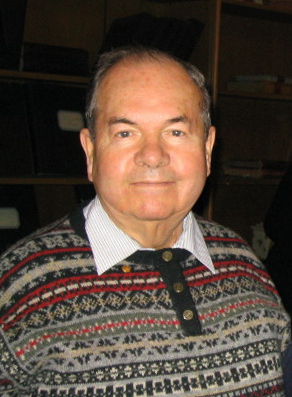Alexei Abrikosov (physicist) facts for kids
Quick facts for kids
Alexei Abrikosov
|
|
|---|---|

Abrikosov in 2003
|
|
| Born | June 25, 1928 |
| Died | March 29, 2017 (aged 88) |
| Citizenship |
|
| Alma mater |
|
| Known for |
|
| Spouse(s) |
Svetlana Yuriyevna Bunkova
(m. 1977) |
| Children | 3 |
| Awards |
|
| Scientific career | |
| Fields | Physics |
| Institutions |
|
Alexei Alexeyevich Abrikosov (Russian: Алексе́й Алексе́евич Абрико́сов; June 25, 1928 – March 29, 2017) was a famous physicist from the Soviet Union, Russia, and the United States. He was known for his work in condensed matter physics, which studies how matter behaves, especially at very cold temperatures. In 2003, he won the Nobel Prize in Physics along with Vitaly Ginzburg and Anthony James Leggett. They received the award for their important ideas about how materials act when they are super cold.
Contents
Early Life and School
Alexei Abrikosov was born in Moscow, Soviet Union, on June 25, 1928. His parents, Alexei Ivanovich Abrikosov and Fani Abrikosova, were both doctors.
He studied at Moscow State University and finished in 1948. After that, he worked at the Institute for Physical Problems of the USSR Academy of Sciences. He earned his Ph.D. in 1951. His Ph.D. work was about how heat spreads in plasmas, which are superheated gases. In 1955, he earned an even higher degree for his work on quantum electrodynamics, which studies how light and matter interact at tiny scales.
His Work as a Scientist
From 1965 to 1988, Alexei Abrikosov worked at the Landau Institute for Theoretical Physics. He also taught at Moscow State University starting in 1965. He taught at other universities too, like the Moscow Institute of Physics and Technology. He became a full member of the USSR Academy of Sciences in 1987. Later, in 1991, he joined the Russian Academy of Sciences.
One of his most important discoveries was about superconductors. These are special materials that can carry electricity with no resistance at very low temperatures. In 1952 and 1957, Abrikosov explained how magnetic flux (the path of a magnetic field) can go through a certain type of superconductor. These are called type-II superconductors. He found that the magnetic field creates tiny, swirling patterns inside these materials. These patterns are now known as the Abrikosov vortex lattice.
Abrikosov also wrote an important book about solid-state physics with his colleagues, Lev Gor'kov and Igor Dzyaloshinskii. This book has helped train many physicists for decades.
In 1991, he moved to the United States and started working at Argonne National Laboratory in Illinois. He was a top scientist there in the Condensed Matter Theory Group. When he won the Nobel Prize, he was studying magnetoresistance. This is a property where some materials change how well they conduct electricity when they are in a magnetic field.
Awards and Honors
Alexei Abrikosov received many awards for his scientific work. Some of these include:
- The Lenin Prize in 1966.
- The Fritz London Memorial Prize in 1972.
- The USSR State Prize in 1982.
- The Landau Prize in 1989.
- The John Bardeen Award in 1991.
- He was elected a Foreign Honorary Member of the American Academy of Arts and Sciences in 1991.
- He shared the 2003 Nobel Prize in Physics.
- He was a member of the Royal Academy of London.
- He was a fellow of the American Physical Society.
- In 2000, he was chosen to be a member of the important National Academy of Sciences.
Other honors he received:
- Member of the Academy of Sciences of the USSR (now Russian Academy of Sciences), 1964
- Honorary Doctor of the University of Lausanne, 1975
- Order of the Badge of Honour, 1975
- Order of the Red Banner of Labour, 1988
- Academician of the Academy of Sciences of the USSR (now Russian Academy of Sciences), 1987
- Elected a Foreign Member of the Royal Society (ForMemRS) in 2001
- Golden Plate Award of the American Academy of Achievement, 2004
- Gold Medal of Vernadsky from National Academy of Sciences of Ukraine, 2015
Personal Life
Alexei Abrikosov's parents, Alexei Ivanovich Abrikosov and Fania Davidovna Woolf, were both doctors. His sister, Maria Alekseevna Abrikósova, was also a doctor.
He was married to Svetlana Yuriyevna Bunkova, and they had three children.
Alexei Abrikosov passed away on March 29, 2017, at the age of 88.
Images for kids
See also
 In Spanish: Alekséi Alekséyevich Abrikósov para niños
In Spanish: Alekséi Alekséyevich Abrikósov para niños
 | Bayard Rustin |
 | Jeannette Carter |
 | Jeremiah A. Brown |


